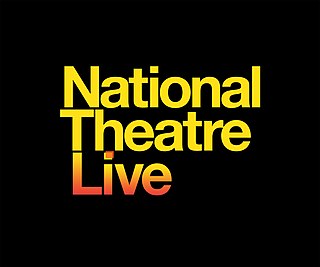Woyzeck is a stage play written by Georg Büchner. Büchner wrote the play between July and October 1836, yet left it incomplete at his death in February 1837. The play first appeared in 1877 in a heavily edited version by Karl Emil Franzos, and was first performed at the Residence Theatre in Munich on 8 November 1913.

Improbable is an English theatre company founded in 1996 by Lee Simpson, Phelim McDermott, Julian Crouch and producer Nick Sweeting. Improbable is funded by Arts Council England in London. According to their statement: "Improbable has grown out of a way of working that means being prepared to create work by the seat of your pants and the skin of your teeth, stepping onstage before you are ready and allowing the audience to have an integral part in the creation of a show."
Punchdrunk is a British theatre company, formed in 2000 by Felix Barrett. Barrett declares, "We want to create work that leaves you spinning and seeing stars."
Nancy Meckler is an American theatre and film director, known for her work in the United Kingdom with Shared Experience, where she was a joint artistic director alongside Polly Teale.
Paul Arditti is a British sound designer, working mainly in the UK and the US. He specialises in designing sound systems and sound scores for theatre. He has won awards for his work on both musicals and plays, including a Tony Award, an Olivier Award, a Drama Desk Award and a BroadwayWorld.com Fans' Choice Award for Billy Elliot the Musical.

Rufus Norris is a British theatre and film director, who is currently the Artistic Director and Joint Chief Executive of the National Theatre.

It Felt Like a Kiss is an immersive theatre production, first performed between 2 and 19 July 2009 as part of the second Manchester International Festival, co-produced with the BBC. Themed on "how power really works in the world", it is a collaboration between film-maker Adam Curtis and theatre company Punchdrunk, with original music composed by Damon Albarn and performed by the Kronos Quartet. The visitor is immersed in sets based on archive footage from Baghdad, 1963; New York City, 1964; Moscow, 1959; in the Amygdala, 1959–1969; and Kinshasa, 1960. The title is taken from The Crystals' 1962 song "He Hit Me ", written by Gerry Goffin and Carole King.
Sleep No More is an immersive theatre production created by British theatre company Punchdrunk. Based on Punchdrunk's original 2003 London production, the company reinvented Sleep No More in a co-production with the American Repertory Theatre (A.R.T.), which opened at the Old Lincoln School in Brookline, Massachusetts on October 8, 2009. It won Punchdrunk the Elliot Norton Award for Best Theatrical Experience 2010.

Valene Kane is a Northern Irish actress. She is perhaps best known for her performances in all three series of BBC Two's BAFTA-nominated The Fall, in which she played Jamie Dornan's first lover, Rose Stagg.

National Theatre Live is an initiative operated by the Royal National Theatre in London, which broadcasts live via satellite, performances of their productions to cinemas and arts centres around the world.

Richard Crawford is a British theatre director and actor known for the Secret Theatre Project. His productions are typically site specific and immersive. He is credited for introducing immersive theatrical productions to Hong Kong and Singapore.
The Crash of the Elysium is a one-hour theatrical work created originally for children by the British company Punchdrunk, centred on the unexplained disappearance of a Victorian steamer named the Elysium and its investigation by the Eleventh Doctor from the television series Doctor Who. It premiered at MediaCityUK in Salford from 1 to 17 July 2011 as part of the Manchester International Festival, with a central narrative idea from Steven Moffat and written by Tom MacRae. It features the Weeping Angels and footage of Matt Smith as the Doctor specially recorded for the show. Its target audience is children from 6 to 12, with adults allowed in if accompanied by a child on "family" shows. A number of adults-only shows were subsequently added following requests from the public. On 16 July 2011, Matt Smith made a surprise visit to the show, appearing in character in place of the final video sequence. The show was remounted in Ipswich in 2012 as part of London 2012's Olympics festival.

Sleep No More is the New York City production of a site-specific work of theatre created by British theatre company Punchdrunk. It is primarily based on William Shakespeare's Macbeth, with inspiration also taken from noir films, as well as some reference to the 1697 Paisley witch trials. It is expanded from their original 2003 London incarnation and their Brookline, Massachusetts 2009 collaboration with Boston's American Repertory Theatre. The company reinvented Sleep No More as a co-production with Emursive, and began performances on March 7, 2011. Sleep No More won the 2011 Drama Desk Award for Unique Theatrical Experience and won Punchdrunk special citations at the 2011 Obie Awards for design and choreography.

Elizabeth Debicki is an Australian actress. After studying drama at the Victorian College of the Arts, she made her film debut with a brief role in the Australian comedy A Few Best Men (2011). Debicki won the AACTA Award for Best Actress in a Supporting Role for her role in The Great Gatsby (2013). She received critical acclaim for her performance in Widows (2018) and later co-starred in Tenet (2020).

The Masque of the Red Death was an original theatre production by British theatre company Punchdrunk, in collaboration with the Battersea Arts Centre that ran from September 2007 to April 2008
59 Productions is an Olivier and Tony Award-winning design studio and production company with offices in London and New York.
Audience immersion is a storytelling technique which attempts to make the audience feel as though they are a part of the story or performance, a state which may be referred to as "transportation" into the narrative, permitting high levels of suspension of disbelief. Audience immersion may be used to enhance learning or to create a more realistic experience. Various methods may be employed to this end, including narrative perspective in writing or technical design in the performing arts. An early example of audience immersion is from the 1846 travelogue Pictures from Italy by Charles Dickens, in which the narrator, speaking in the first person, addresses the reader using second-person pronouns, allowing the reader to "picture themselves with Dickens as he travels."

Network is a play by Lee Hall, adapted from the 1976 film of the same name which had an Academy Award-winning screenplay by Paddy Chayefsky and was directed by Sidney Lumet.
Immersive theater differentiates itself from traditional theater by removing the stage and immersing audiences within the performance itself. Often, this is accomplished by using a specific location (site-specific), allowing audiences to converse with the actors and interact with their surroundings (interactive), thereby breaking the fourth wall.
The Third Day is a British-American psychological thriller–folk horror drama television serial created by Felix Barrett and Dennis Kelly for HBO and Sky Atlantic.










